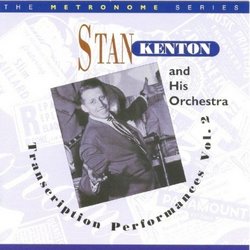| All Artists: Stan Kenton Title: The Transcription Performances, Vol. 2 Members Wishing: 1 Total Copies: 0 Label: Hep Records Original Release Date: 5/2/2000 Release Date: 5/2/2000 Genres: Jazz, Pop, Broadway & Vocalists Styles: Swing Jazz, Traditional Jazz & Ragtime, Orchestral Jazz, Easy Listening, Oldies, Traditional Vocal Pop Number of Discs: 1 SwapaCD Credits: 1 UPC: 603366006725 |
Search - Stan Kenton :: The Transcription Performances, Vol. 2
 | Stan Kenton The Transcription Performances, Vol. 2 Genres: Jazz, Pop, Broadway & Vocalists
Made for radio performance, these tracks have all the fidelity and presence of the recordings done in Capitol's studio for commercial issue. They give a breathtaking picture of the Kenton Orchestra of the mid-1940s. Kai Wi... more » |
Larger Image |
CD Details
Synopsis
Amazon.com
Made for radio performance, these tracks have all the fidelity and presence of the recordings done in Capitol's studio for commercial issue. They give a breathtaking picture of the Kenton Orchestra of the mid-1940s. Kai Winding, perhaps the greatest of all Kenton's trombonists, is the most stirring soloist. He is featured on Gene Roland's "Ecuador", an early and hugely successful Latin experiment, and he steals the limelight from vocalist June Christy on "I'd Be Lost Without You." Christy was at her best at this time. Accompanied by Kenton's piano, she turns in a beautiful "I Got It Bad." Another Ellington tune, "Sophisticated Lady" (Kenton didn't usually use Duke's songs), is a bass feature for Eddie Safranski, described by another member of the band as "having the biggest elastic band in the world." The album reflects the whole range of the band's repertoire, and the fiery instrumentals include "Painted Rhythm" and "Unison Riff." Four tracks at the end from an exciting Hollywood Bowl concert include a ripping version of "Lover" and the band's comic "St. James' Infirmary" in a seven-minute version. The album intertwines satisfyingly with the similarly excellent first volume, The Transcription Performances 1945-1946. --Steve Voce

 Track Listings (27) - Disc #1
Track Listings (27) - Disc #1